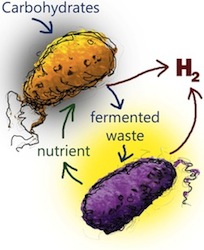Indiana University biologist James McKinlay has received the Early Career Research Program award from the Department of Energy (DOE). Along with honor, the award comes with $750,000 that will help McKinlay, who is an assistant professor in the Department of Biology, continue to research how microbes might work together to produce hydrogen gas biofuels.
 While others are researching better biofuels with microbes, McKinley said most are focusing on engineering single species that can perform all the necessary tasks needed to produce biofuels.
While others are researching better biofuels with microbes, McKinley said most are focusing on engineering single species that can perform all the necessary tasks needed to produce biofuels.
“Coordinating all these tasks in a single microbe can be challenging and can lead to undesired traits like the inefficient use of the food source,” explained McKinley. “But in nature, diverse microbes often work together to use food sources like plant-derived lignin and cellulose that resist degradation. The idea here is to create a similar cooperative relationship in the lab where each microbe supplies the other with a nutrient required for survival.”
 McKinlay is attempting to decipher how metabolisms of two microbes interact, evolve together to improve nutrient transfer and discover how to optimize microbes to create a tailor-made mixture. When taken together, the result would be the economical production of hydrogen gas and other biofuels from renewable resources.
McKinlay is attempting to decipher how metabolisms of two microbes interact, evolve together to improve nutrient transfer and discover how to optimize microbes to create a tailor-made mixture. When taken together, the result would be the economical production of hydrogen gas and other biofuels from renewable resources.
“We’re taking a lesson from nature that multiple microbial species help each other to thrive on food sources such as plant residues that those same species could not use if on their own,” continued McKinlay. “We already know that mixtures of specialized microbes can sometimes outperform a single engineered strain for producing chemicals of value to society.”
With the ultimate strategy of enhancing biofuels production, McKinlay is executing the idea to develop a co-culture of a photosynthetic bacteria and a fermentative microbe that uses sugar and energy from sunlight to produce hydrogen gas.

